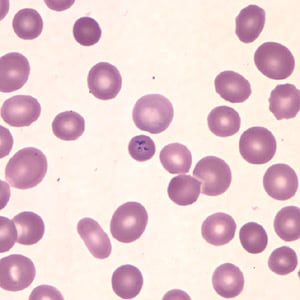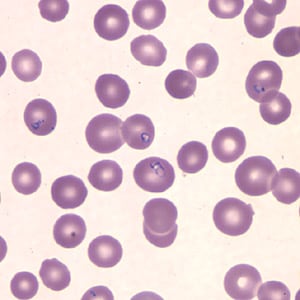
Monthy Case Studies - 2003
Case #99 - January, 2003
A 61-year-old woman from Rhode Island with non-Hodgkin's lymphoma had bone marrow transplants in 1996 and June 2002. She received a single donor lymphocyte transfusion on October 1, 2002, followed by platelets and red blood cells from approximately 24 donors. She was hospitalized several times in November and December. She reported no recent travel outside the state of Rhode Island. Below are images from her Giemsa stained blood smears. What is your diagnosis? Based on what criteria?

Figure A

Figure B
Answer to Case #99
This was a suspected case of transfusion-related babesiosis caused by Babesia microti. The woman was diagnosed with Babesia by microscopy from smears taken in early December. PCR results were positive for Babesia microti. The Babesia microti IFA result was 1:256. Diagnostic features observed included:
- the presence of pleomorphic intra-erythrocytic organisms, consistent with Babesia sp.
- vacuolated organisms, also consistent with Babesia sp.
- the absence of pigment in the parasites infecting the red blood cells.
More on: Babesiosis
Images presented in the monthly case studies are from specimens submitted for diagnosis or archiving. On rare occasions, clinical histories given may be partly fictitious.
 ShareCompartir
ShareCompartir


